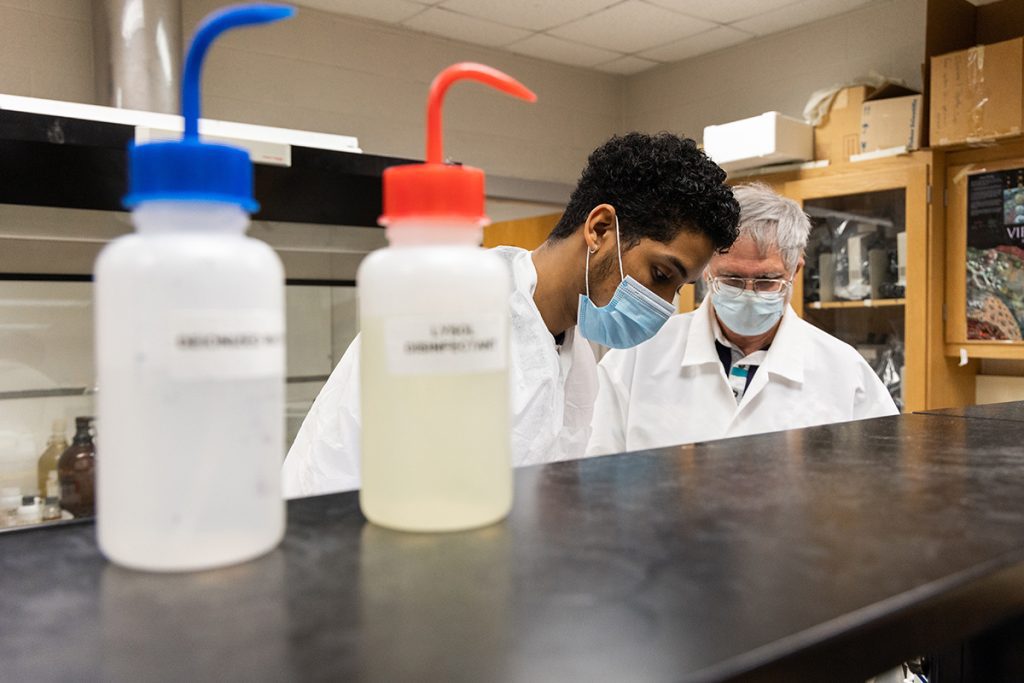A seventh-grade science project on protozoa found in pond water has led to a lifelong fascination with microbiology for Dr. Steve Baron, Harry G.M. Jopson Professor of Biology at Bridgewater College. As a member of Bridgewater’s faculty for 26 years teaching courses on microbiology, human genetics and molecular biology, Baron has maintained a strong research focus, particularly in the field of biodegradable plastics.
Baron studies bacteria found in soil, from a genus called Streptomyces, that break down biodegradable, plastic-like materials called polyhydroxyalkanoates (PHAs) and use them for food. His research has identified the enzyme that catalyzes the breakdown process, and he is studying under what conditions synthesis of this enzyme is turned on and off. Further research could lead to increased production and use of PHA plastics that can be broken down naturally over time.
“There’s so much to discover in the field of microbiology, even in this day and age,” Baron says. “It’s just this different world.”
By keeping current in his scholarship, he is able to advance his academic interests while sharing new information and evolving research modalities with his students. He uses research as a teaching tool and has witnessed students who have struggled in a traditional classroom setting blossom in the lab.
“I believe students learn science best through hands-on laboratory experiences in which they are challenged to think critically, solve problems, apply what they learn and work through difficulties in as realistic settings as possible,” he says.
Baron especially enjoys working one-on-one with students, whether on his research work or projects in a student’s field of interest. He often works with two or three students per semester outside of his regular classes, and to date has mentored 109 students on independent study, honors and summer research projects.
“I love finding the spark of learning in each student,” he says. “It’s such an enriching experience working with young people.”
Seeing students move on to the next phases of their lives is the most meaningful part of his job. One of his former students, Dr. Jason Ridlon ’02, is now an associate professor in the animal sciences department at the University of Illinois Urbana-Champaign. Ridlon says an independent study project on crayfish with Baron his junior year “changed my life forever.” That was the moment he knew he wanted to become a professor, himself. Ridlon, recipient of Bridgewater’s 2019 Young Alumnus Award, has continued to collaborate with Baron on research. Ridlon’s lab works with genes that code for enzymes involved in steroid modifications by bacteria in the human colon, and he sends DNA samples to Baron for further research. Baron’s molecular biology students learn how to amplify and clone the bacterial genes for enzyme production in E. coli and share their results with Ridlon’s lab, with the ultimate goal of contributing to his publications.
“I tell my students upfront that we may encounter difficulties with this project and we’ll have to work them out,” Baron says. “This is not a textbook where you follow directions in the lab and everything works. This is an open-ended thing—that’s the way life is.”
“Giving students a chance to apply what they are learning in the classroom is invaluable and the mark of excellence in undergraduate education,” Ridlon says. “While I have had many great teachers and professors, Dr. Baron has had the most lasting impact on my life and career.”
Baron has been honored for his commitment to teaching and mentorship as the 2012 recipient of the College’s Martha B. Thornton Faculty Recognition Award and the 2019 winner of the Virginia Foundation for Independent Colleges’ H. Hiter Harris Jr. Excellence in Undergraduate Teaching Award.
“I like the ideals of the College and its devotion to developing the whole student, even though I teach science,” Baron says. “I enjoy seeing students develop personally, not just professionally.”
— By Jessica Luck


